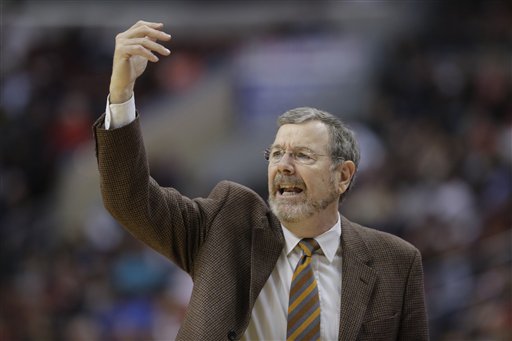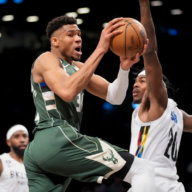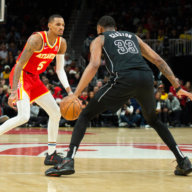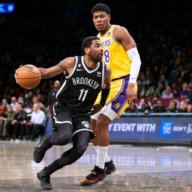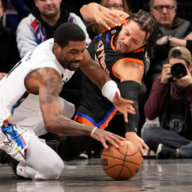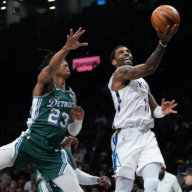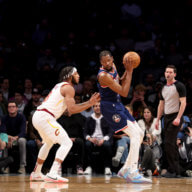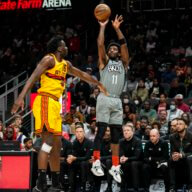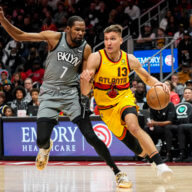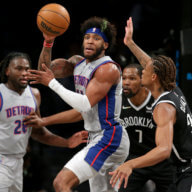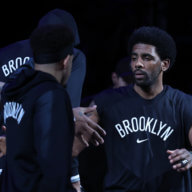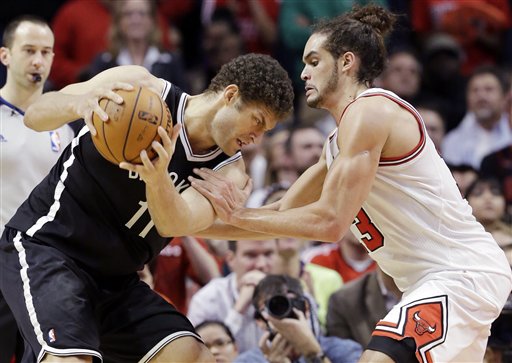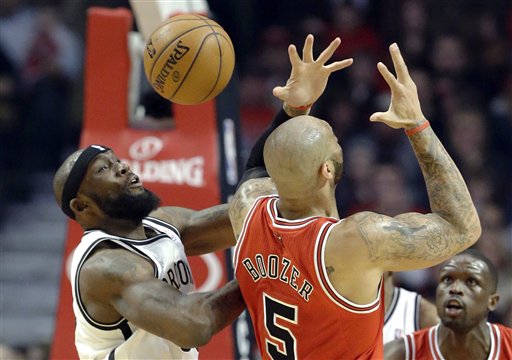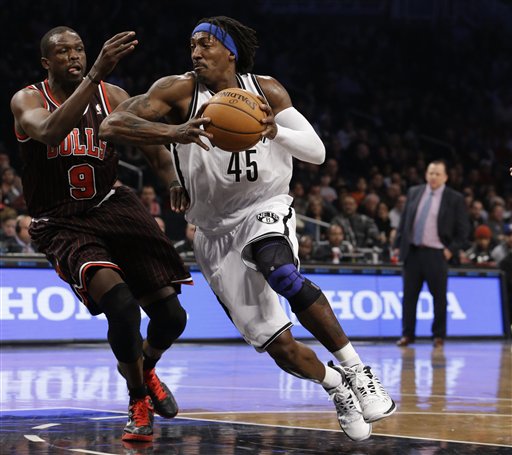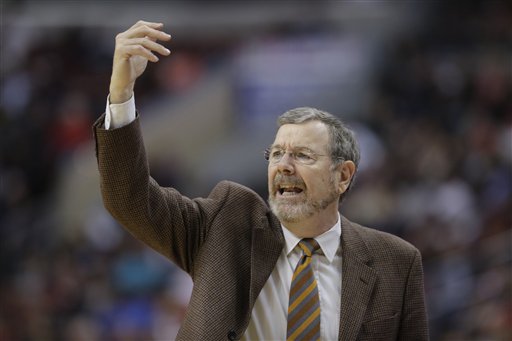
The Nets have most of their core set through at least the 2015-16 season. They have a general manager. A political billionaire Russian oligarch owner. A starting point guard. A starting shooting guard. A starting small forward. A starting center. But they’ve still got one gaping hole to fill: who’s going to tell those players what to do? Who will become the next Brooklyn Nets coach?
This is, by far, Brooklyn’s biggest burning question, and one that likely won’t be answered at least until the next round of the playoffs ends, given who they’re looking at.
The Nets have a poll on their site right now, apparently gauging fan interest in what type of coach the Nets should go after. The options are: “offensive-minded,” “defensive-minded,” “winning experience,” “analytical,” and “focused on player development.”
Putting aside for a moment that these things aren’t mutually exclusive (aren’t most analytical coaches either offensive-minded or defensive-minded? Or both? Doesn’t “winning experience” come with all of this territory?), or that the current leading option (“winning experience”) was what the Nets went after in Avery Johnson (Johnson had the highest winning percentage among all coaches in NBA history when the Nets signed him), I have some concerns about the next-highest option (“defensive-minded”).
Here’s what worries me about going after a defense-first coach. Before joining the Nets, Avery Johnson also had a reputation for being a defense-first coach, with a commitment to making Brooklyn a top-10 defensive team in the league. Whether the Nets lacked the talent for it or Johnson lacked the system for it, it just didn’t happen. Meanwhile, as the focus appeared to be on a floundering defense, the team’s offense struggled through isolation-heavy third quarters and uncreative offensive sets.
It’s not as simple as “the offense will figure itself out.” It didn’t in the team’s most important moments. The Nets ran more isolation plays than any team in the league last season. If the Nets get a coach that has a primary focus improving their defense, the offense may continue to struggle.
The targets
The short list at this point appears to be Indiana Pacers assistant Brian Shaw, Memphis Grizzlies coach Lionel Hollins, and former Milwaukee Bucks coach Scott Skiles, three coaches with vastly different approaches and systems of coaching.
Skiles is a defense-first coach, but also a more creative offensive coach than either Avery Johnson or P.J. Carlesimo; Zach Lowe of Grantland noted some of his more interesting sets back in January:
When the Bucks replaced an elite big-man defender with an undersize chucker who could run the pick-and-roll, Skiles retooled his offense into a fast-paced, assist-happy fun-time machine. Milwaukee ran when it could, and within the half-court, Skiles scrapped the post game and predictable pick-and-rolls (up high for Jennings, and on the wing for Salmons back in 2010) in favor a whirling circular system of high-speed dribble hand-offs that turned into impromptu pick-and-rolls at the elbow area. Jennings and Ellis would sprint down one side, turn and run the baseline, pop up for a handoff near the opposite elbow, and grab the ball at full running speed. From there, they could either penetrate the lane, pitch to their partner at the top in a similar action, or (gulp) launch a difficult mid-range jumper. The system didn’t always lead to efficient shots — no Ellis-dominated system could — but it worked as an antidote to en vogue defensive systems designed to force all pick-and-rolls away from the middle. By getting Ellis and Jennings the ball at high speed, and while running the center of the court, Milwaukee could manufacture the kind of penetration defenses were trying to deny.
Skiles also incorporated some funky actions for Ilyasova and a lot of very creative sets designed to spring Dunleavy, a plus/minus god so far in Milwaukee, and one of the best bang-for-the-buck free-agent signings of the past three summers.
Skiles is known as a cranky disciplinarian, and often tinkered with Milwaukee’s rotation to the chagrin of his players. He wouldn’t have much to tinker with in Brooklyn — Tyshawn Taylor isn’t taking that spot from Deron Williams anytime soon — but Skiles’s grating style could get under the roster’s skin. Think Avery Johnson.
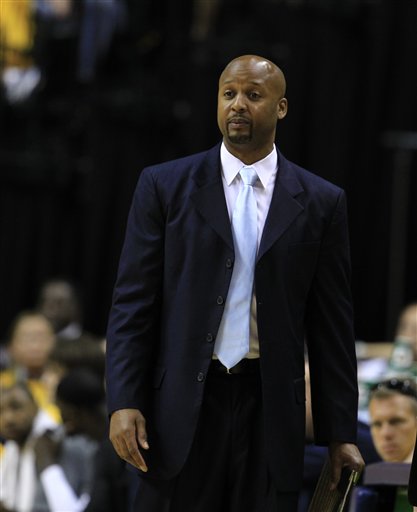 Shaw is the “hot” name in coaching circles, long considered the next great assistant-turned-coach possibility in the same vein as Tom Thibodeau. Since retiring, Shaw has been an assistant with the Los Angeles Lakers (under Phil Jackson for all but one season) and the Indiana Pacers (under Frank Vogel), and would reportedly bring Jackson’s famed triangle offense with him anywhere he goes. Nets general manager Billy King has said he can imagine Brooklyn’s offense successfully executing the triangle.
Shaw is the “hot” name in coaching circles, long considered the next great assistant-turned-coach possibility in the same vein as Tom Thibodeau. Since retiring, Shaw has been an assistant with the Los Angeles Lakers (under Phil Jackson for all but one season) and the Indiana Pacers (under Frank Vogel), and would reportedly bring Jackson’s famed triangle offense with him anywhere he goes. Nets general manager Billy King has said he can imagine Brooklyn’s offense successfully executing the triangle.
Shaw’s been an assistant in the NBA for about a decade and has gotten multiple interviews, which begs the question: why hasn’t a team hired him yet?
Is he just a bad interview? (I’ve heard this.) Is there something about him that makes him appear to be a darling on the outside, but privately grating? Are teams scared of the triangle offense after seeing it crash and burn with former Minnesota Timberwolves coach Kurt Rambis? (I think this is ridiculous, since it was plainly obvious that the triangle was in no way suited for Minnesota’s roster at that time.)
Nonetheless, if the Nets believe the triangle is a method for success with this roster, and Phil Jackson isn’t walking through that door, the 47-year-old Shaw might be the way to go.
Hollins, currently coaching the Memphis Grizzlies, is an old-school coach and motivator. Under Hollins, Memphis has increased its winning percentage each year since he took the job (for the second time) in 2008-09.
Hollins is not known for being an analytics coach, though his lead assistant — Dave Joerger — is considered one of the forefront analytic minds in assistant coaching. He is also not considered a candidate for Brooklyn. The Nets are one of the few teams in the league that’s still resistant to the analytics movement in the NBA. They are flatly not interested in SportVU optical tracking data cameras, considered the forefront for analytic-minded teams (the cameras cost up to $100,000 to install). They do have an analytics department, but it’s not clear how much influence they have beyond the D-League.
The Grizzlies say they enjoy playing for him and he’s led them to the Western Conference Finals on the backs of their “grit-and-grind” defense (they employ Defensive Player of the Year Marc Gasol and elite perimeter defender Tony Allen). He’s not a coach known for offensive creativity but can adjust a system to the talents of his players. His Grizzlies played a notoriously slow pace, similar to Brooklyn last season.
This is King’s biggest assignment of the offseason. The Nets had a rocky first season partially because their coaching situation was so transient. The big name is less important than the right one; it’s better to find someone who could become Brooklyn’s Jerry Sloan then to go after Jerry Sloan. The right fit could set this franchise on a positive course for the next decade, whether that’s Skiles (don’t think so), Shaw (exciting but I have my reservations), Hollins (boring, but I see the value), or another darkhorse candidate.

